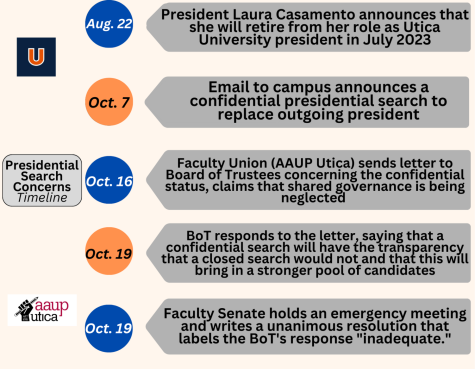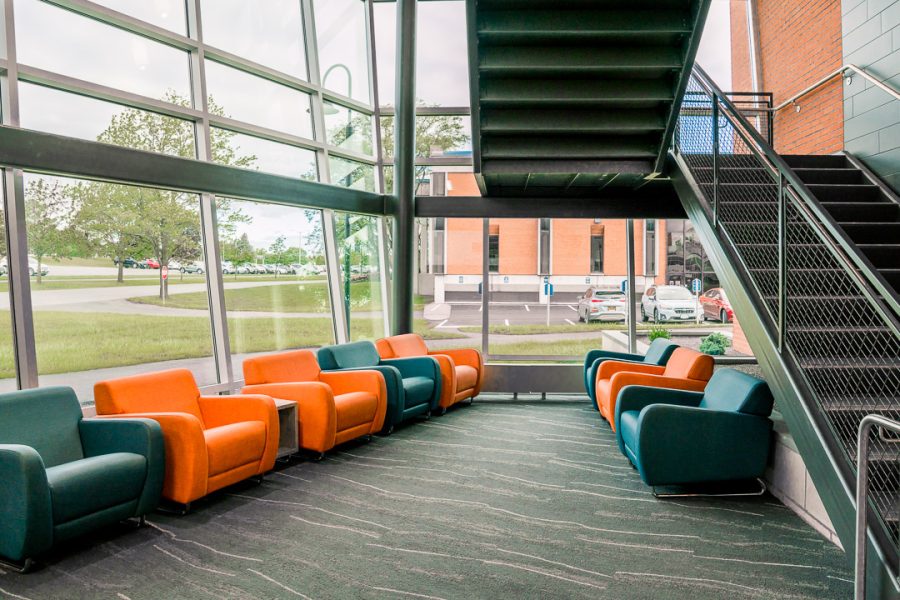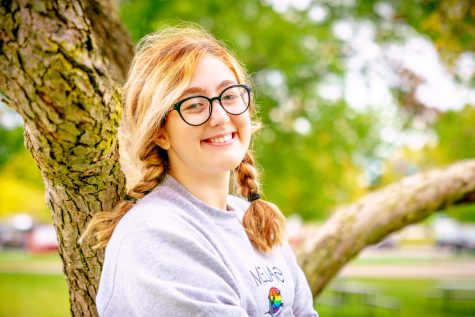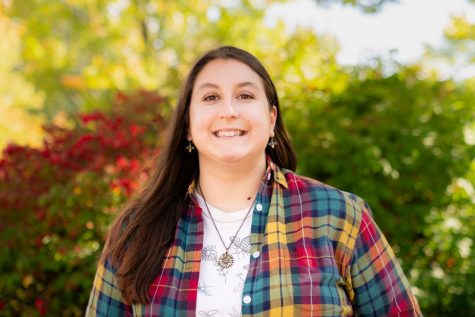Confidential presidential search raises concerns on campus
Empty chairs in the corner of Utica University’s Science Center.
October 20, 2022
The Utica University section of the American Association of University Professors, otherwise known as AAUP-Utica or the Faculty Union on campus, has expressed concerns via a public letter about the recently announced confidential presidential search.
The Board of Trustees has responded with an explanation as to why they decided to host a confidential search for the next president of the university.
AAUP-Utica, which promotes shared governance and transparency, maintains that the search for the next university president should be an open one for all members of the campus community.
“Utica University has always had a history of shared governance. A confidential search flies in the face of shared governance and signals that the Board of Trustees does not deem it necessary to involve the campus community in any meaningful way,” AAUP-Utica President Leonore Fleming said. “This is not just a faculty issue, but an issue that impacts the entire campus community. Transparency and shared governance are necessary for this institution to thrive.”
Several pieces of correspondence were shared since an announcement update was made on Oct. 7.
October 7: Campuswide Presidential Search update
The concerns arose from an update emailed to the student body and posted to the presidential search page on Oct. 7, which announced that the institution has chosen RH Perry & Associates Inc. to lead the presidential search.
The presidential search was spurred by an email sent on August 22 by President Laura Casamento announcing that she will be retiring at the end of the Spring 2023 academic semester.
According to the announcement from Heidi Hoeller ‘91, the chairperson of the presidential search committee, RH Perry suggested a confidential search due to the different climate of today’s hiring environment, and that hosting a confidential search could potentially expand the options the University would have for a new president.
“Search firms, including RH Perry, recommended the committee undertake a “confidential search” process to potentially broaden the prospective pool of qualified candidates,” the announcement said. “A confidential search means the candidates are not introduced to the University community until a president is announced.”
According to Robert Brvenik ‘77, the chairman of the Board of Trustees, running a confidential search increases the quality of the candidate pool.
“By running a confidential search you have a better chance of getting sitting presidents, provosts, maybe strong deans and so forth to do it,” Brvenik said.
Brvenik went on to explain that while there was debate within the board, one goal stood out to sway them.
“We feel it is most important that you have the best potential candidates for the job,” Brvenik said.

October 16: Faculty Union response
The AAUP-Utica sent a public letter to the Board of Trustees on Sunday, Oct. 16 expressing concerns about the campus’s confidential presidential search.
“AAUP policy statements make clear that such decisions to forgo public campus visits and public forums by finalists violate long standing principles of shared governance,” the AAUP Statement on Presidential Searches said. “Shared governance helps ensure that universities and colleges serve the public interest.”
This letter, sent to the Board of Trustees by AAUP-Utica president Leonore Fleming, further explained the importance of an open and transparent search process by bringing up a key point in the AAUP guide.
“…open visits are crucial in the success of the search process because they permit members of the campus community to participate in providing impressions, as well as to contribute to the candidate’s understanding of the culture of the institution,” the AAUP guide said.
This guideline led the AAUP-Utica to pose the following question in their letter,
“Given the importance of transparency and shared governance on this campus, is a confidential search the best way to attract those candidates who would be a “good fit” for Utica University and who can understand and appreciate our campus culture?”
Overall goals of having an open and transparent search stem from wanting the selected applicants to have full understanding of what students, faculty and staff on campus need in a new president, Fleming said.
Douglas Edwards, professor of philosophy and vice president of the AAUP-Utica, shared a similar sentiment.
“Excluding the campus community from meeting candidates is bad for both the University and the potential candidates: we on campus do not get the opportunity to meet the candidates and get a sense of their priorities, and candidates are unable to get a proper sense of the institution to help them figure out if we are a good fit for them,” Edwards said. “We have had such a push to return to in-person learning after the pandemic because of the significance of face-to-face interactions, and it is unfortunate that the Board of Trustees has chosen to do something completely counter to this in such an important case by preventing face-to-face interactions between presidential candidates and the campus community.”
Attached in the letter were also several sources of past colleges and universities using confidential search tools which then led to negative results.
An article titled “The Cost of Closed Searches” by the AAUP explores several instances where presidents have been elected confidentially and due to this, important information which would have prevented them from receiving the role were never brought to light.
“Secrecy deprives university search committees of the benefit of information—including disqualifying information—that might be volunteered if finalists’ names were publicly known,” the article said.
These issues included monetary and discriminatory problems that campuses were unaware their new presidents had due to closed searches according to the article.
October 19: Response from Board of Trustees
The Board of Trustees sent a response to the AAUP-Utica the morning of Wednesday, Oct. 19. The letter said that the decision to use a confidential search was deliberated in length by the Board.
“The decision was not made lightly by the Board, but rather after careful consideration of the advantages and disadvantages, perspectives from search firms, and observation of the practice of our peer institutions,” the letter signed by Brvenik said.
In addressing the concern of transparency in the presidential search, the letter suggested that having a confidential search allows more transparency than a closed search, despite not being as transparent as a completely open search.
According to Brvenik, an open search would entail the public being made aware of finalist applicants after they are selected by a committee. This would be followed by an open forum hosted on campus where constituents are able to meet and speak with them.
A closed search would be conducted privately by a committee, who would gather candidates and information to present to the Board of Trustees with two to four finalists. The Board would then select the new president and announce to campus their decision.
With a confidential approach, the search firm conducts forums on campus allowing constituents to give input on the qualities for potential candidates. The firm will then gather candidates, the presidential search committee will interview the candidates to determine two to four finalists and then an assembled feedback committee will review the finalists. They will then present pros and cons of each candidate to the Board of Trustees who will make the final decision.
A campus wide survey was made available the same day to allow for a wider pool of feedback from the community and those who were unable to attend the forums held by RH Perry.
“Although this is not the open search you are advocating for, this hybrid method is more transparent than a search that is completely closed,” the response said.
October 19: Faculty Senate resolution
Later in the afternoon, the Faculty Senate held an emergency meeting to discuss the response among other pressing concerns surrounding the presidential search. During this meeting, the Senate voted unanimously on a resolution that the response was inadequate.
“The Utica University Faculty Senate endorses the October 16, 2022 AAUP-[Utica] Open Letter to the Chairperson of the Presidential Search Committee,” the resolution said. “The response by the Chairperson of the Board of Trustees dated October 19, 2022, does not adequately address the concerns raised by the AAUP-[Utica].”


















![President Todd Pfannestiel poses with Jeremy Thurston chairperson Board of Trustees [left] and former chairperson Robert Brvenik [right] after accepting the university's institutional charter.](https://uticatangerine.com/wp-content/uploads/2023/10/unnamed.jpeg)























































































































Shauna • Oct 20, 2022 at 12:44 pm
Thank you for sharing this information. In a world such as we live in currently, open and transparent communication with the ability to allow ALL stakeholders to learn about potential leaders for our university should be our goal. A university is only as strong as its students and faculty and staff members – the reason for existence. Utica has come too far to potentially threaten its core –
Respectfully